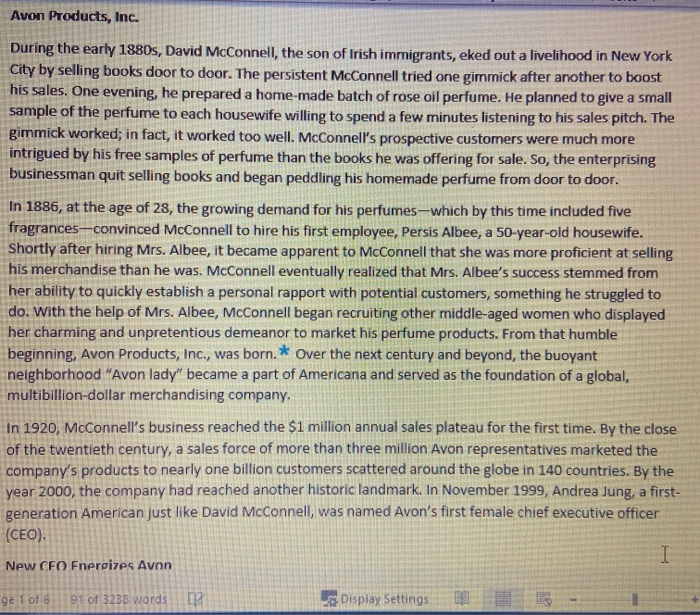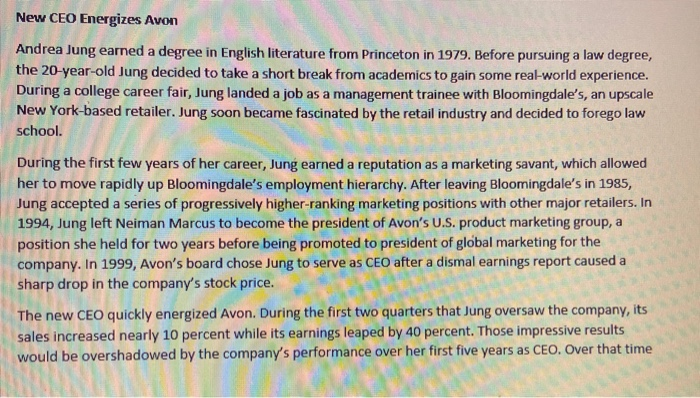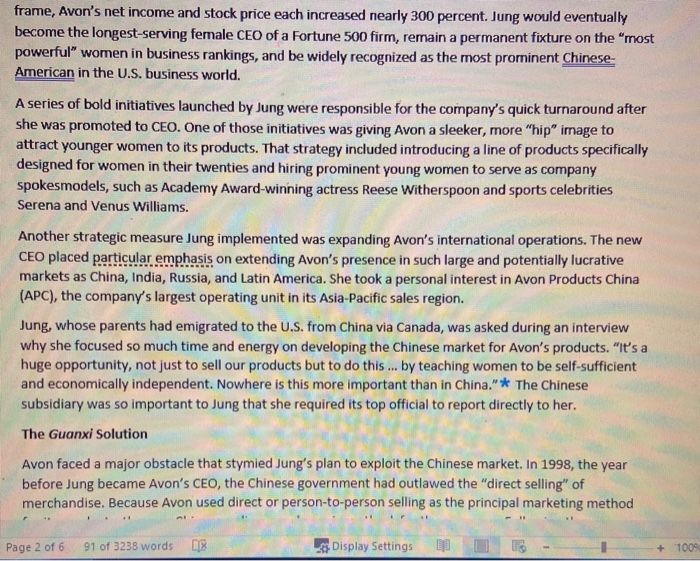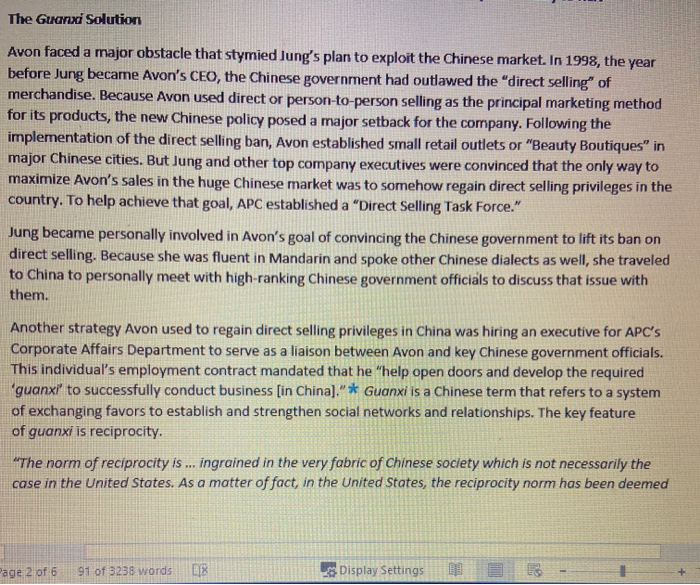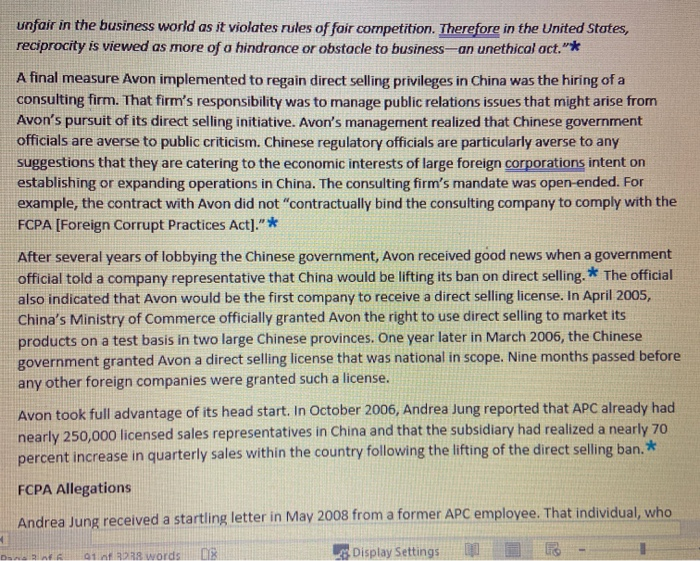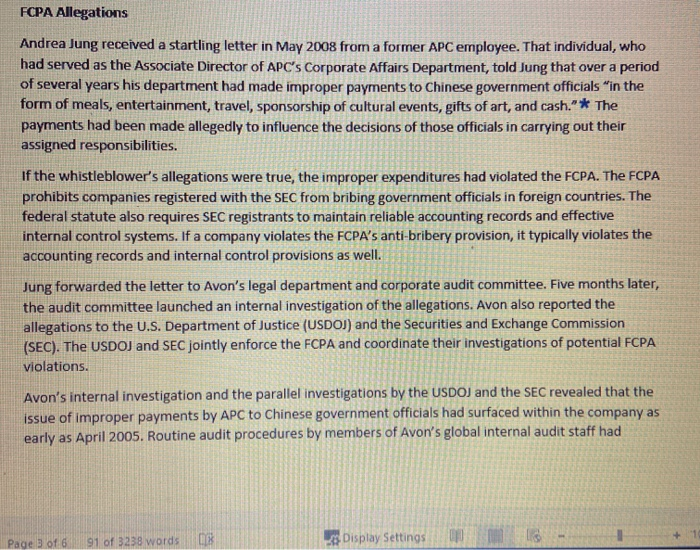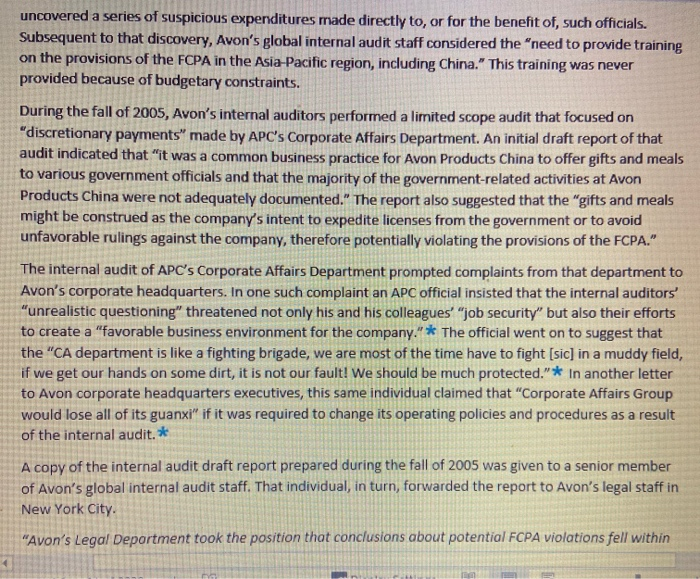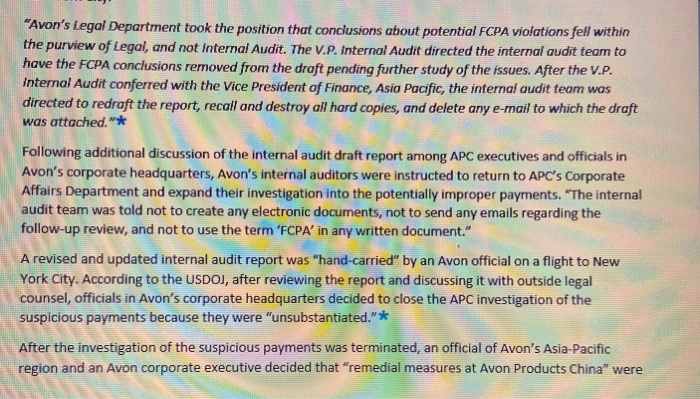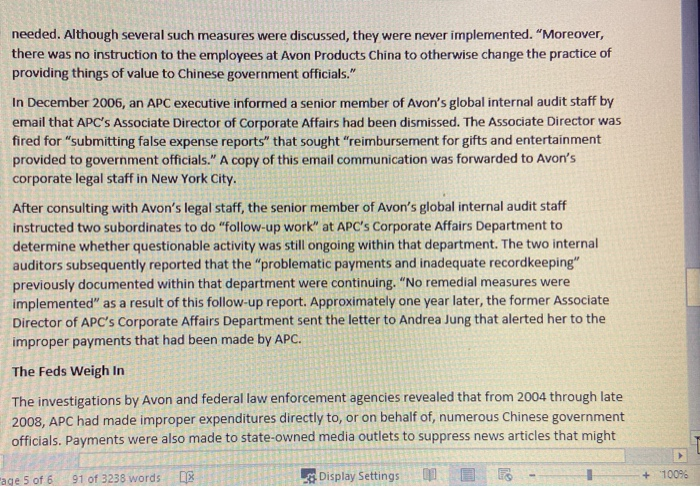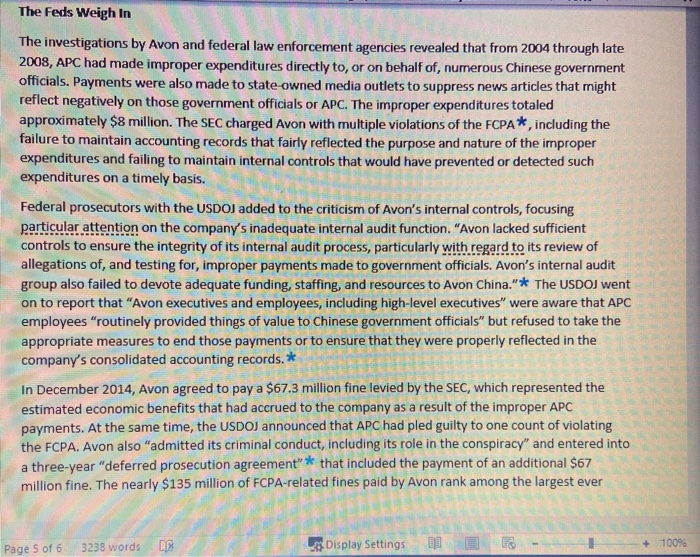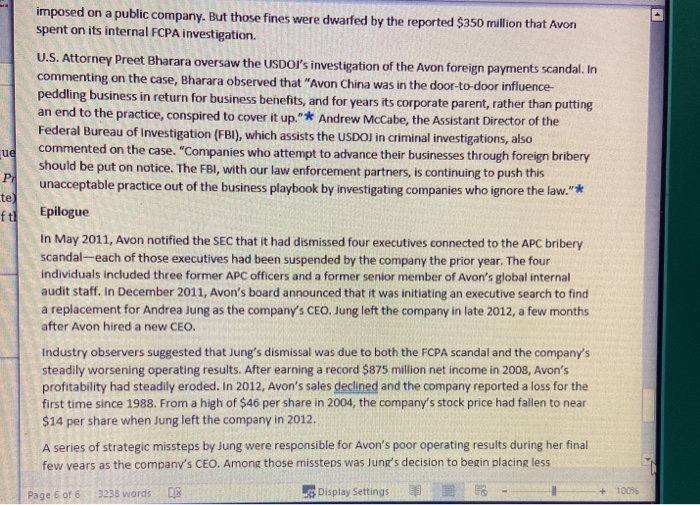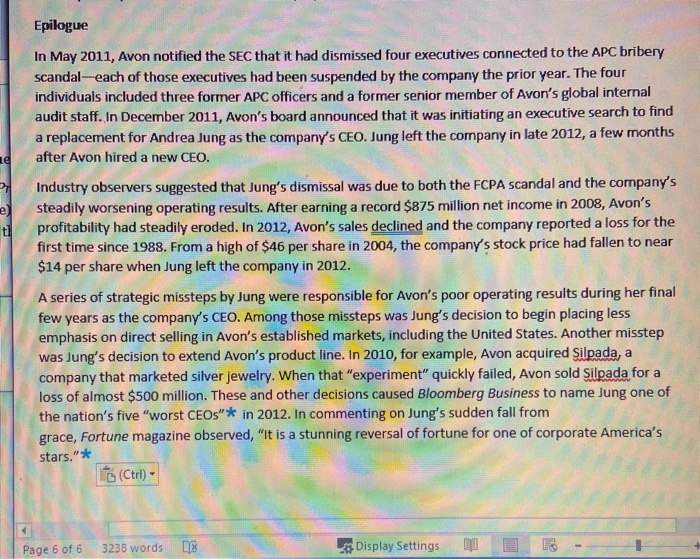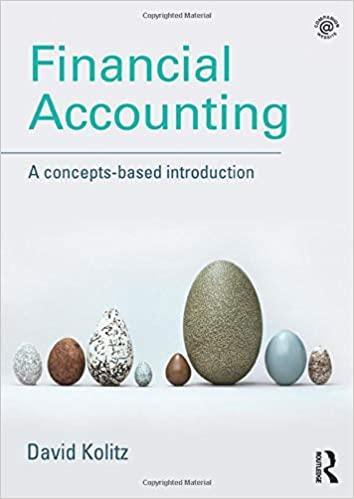The improper payments made by APC occurred during the time frame that Andrea Jung served as Avon's CEO. Was she "responsible" for those payments even if she was unaware of them? Why or why not? Identify the role and responsibilities that an internal audit staff typically assumes in a company's internal control system. See the "Avon Products, Inc." case for this question. The IMA Statement of Ethical Professional Practice identifies four ethical standards, three of which are competence, confidentiality, and integrity (see "Ethics Center" on IMA website). Relying on those three ethical standards, evaluate the conduct of Avon's internal audit staff during the company's initial investigation of the questionable payments made by APC. See the "Avon Products, Inc." case for this question. Do you agree with Avon's corporate legal staff that the potential FCPA violations were a legal issue and not an internal audit issue? Explain. See the "Avon Products, Inc." case for this question. The COSO internal control framework identifies five components of an entity's internal control. Which, if any, of those five components of Avon's internal control were flawed? Explain. If there were multiple flaws in Avon's internal control, identify which one you believe was most serious and defend your choice. Avon Products, Inc. During the early 1980s, David McConnell, the son of Irish immigrants, eked out a livelihood in New York City by selling books door to door. The persistent McConnell tried one gimmick after another to boost his sales. One evening, he prepared a home-made batch of rose oil perfume. He planned to give a small sample of the perfume to each housewife willing to spend a few minutes listening to his sales pitch. The gimmick worked; in fact, it worked too well. McConnell's prospective customers were much more intrigued by his free samples of perfume than the books he was offering for sale. So, the enterprising businessman quit selling books and began peddling his homemade perfume from door to door. In 1886, at the age of 28, the growing demand for his perfumes-which by this time included five fragrances-convinced McConnell to hire his first employee, Persis Albee, a 50-year-old housewife. Shortly after hiring Mrs. Albee, it became apparent to McConnell that she was more proficient at selling his merchandise than he was. McConnell eventually realized that Mrs. Albee's success stemmed from her ability to quickly establish a personal rapport with potential customers, something he struggled to do. With the help of Mrs. Albee, McConnell began recruiting other middle-aged women who displayed her charming and unpretentious demeanor to market his perfume products. From that humble beginning, Avon Products, Inc., was born. * Over the next century and beyond, the buoyant neighborhood "Avon lady" became a part of Americana and served as the foundation of a global, multibillion-dollar merchandising company. In 1920, McConnell's business reached the $1 million annual sales plateau for the first time. By the close of the twentieth century, a sales force of more than three million Avon representatives marketed the company's products to nearly one billion customers scattered around the globe in 140 countries. By the year 2000, the company had reached another historic landmark. In November 1999, Andrea Jung, a first- generation American just like David McConnell, was named Avon's first female chief executive officer (CEO) I New CFO Energizes Avon ge 1 of 6 91 of 3238 words 02 Display Settings ED New CEO Energizes Avon Andrea Jung earned a degree in English literature from Princeton in 1979. Before pursuing a law degree, the 20-year-old Jung decided to take a short break from academics to gain some real-world experience. During a college career fair, Jung landed a job as a management trainee with Bloomingdale's, an upscale New York-based retailer. Jung soon became fascinated by the retail industry and decided to forego law school. During the first few years of her career, Jung earned a reputation as a marketing savant, which allowed her to move rapidly up Bloomingdale's employment hierarchy. After leaving Bloomingdale's in 1985, Jung accepted a series of progressively higher-ranking marketing positions with other major retailers. In 1994, Jung left Neiman Marcus to become the president of Avon's U.S. product marketing group, a position she held for two years before being promoted to president of global marketing for the company. In 1999, Avon's board chose Jung to serve as CEO after a dismal earnings report caused a sharp drop in the company's stock price. The new CEO quickly energized Avon. During the first two quarters that Jung oversaw the company, its sales increased nearly 10 percent while its earnings leaped by 40 percent. Those impressive results would be overshadowed by the company's performance over her first five years as CEO. Over that time frame, Avon's net income and stock price each increased nearly 300 percent. Jung would eventually become the longest-serving female CEO of a Fortune 500 firm, remain a permanent fixture on the most powerful women in business rankings, and be widely recognized as the most prominent Chinese American in the U.S. business world. A series of bold initiatives launched by Jung were responsible for the company's quick turnaround after she was promoted to CEO. One of those initiatives was giving Avon a sleeker, more "hip" image to attract younger women to its products. That strategy included introducing a line of products specifically designed for women in their twenties and hiring prominent young women to serve as company spokesmodels, such as Academy Award-winning actress Reese Witherspoon and sports celebrities Serena and Venus Williams. Another strategic measure Jung implemented was expanding Avon's international operations. The new CEO placed particular emphasis on extending Avon's presence in such large and potentially lucrative markets as China, India, Russia, and Latin America. She took a personal interest in Avon Products China (APC), the company's largest operating unit in its Asia-Pacific sales region. Jung, whose parents had emigrated to the U.S. from China via Canada, was asked during an interview why she focused so much time and energy on developing the Chinese market for Avon's products. "It's a huge opportunity, not just to sell our products but to do this... by teaching women to be self-sufficient and economically independent. Nowhere is this more important than in China."* The Chinese subsidiary was so important to Jung that she required its top official to report directly to her. The Guanxi Solution Avon faced a major obstacle that stymied Jung's plan to exploit the Chinese market. In 1998, the year before Jung became Avon's CEO, the Chinese government had outlawed the "direct selling" of merchandise. Because Avon used direct or person-to-person selling as the principal marketing method Page 2 of 6 91 of 3238 words D% Display Settings + 1009 The Guanxi Solution Avon faced a major obstacle that stymied Jung's plan to exploit the Chinese market. In 1998, the year before Jung became Avon's CEO, the Chinese government had outlawed the "direct selling" of merchandise. Because Avon used direct or person-to-person selling as the principal marketing method for its products, the new Chinese policy posed a major setback for the company. Following the implementation of the direct selling ban, Avon established small retail outlets or "Beauty Boutiques" in major Chinese cities. But lung and other top company executives were convinced that the only way to maximize Avon's sales in the huge Chinese market was to somehow regain direct selling privileges in the country. To help achieve that goal, APC established a "Direct Selling Task Force." Jung became personally involved in Avon's goal of convincing the Chinese government to lift its ban on direct selling. Because she was fluent in Mandarin and spoke other Chinese dialects as well, she traveled to China to personally meet with high-ranking Chinese government officials to discuss that issue with them. Another strategy Avon used to regain direct selling privileges in China was hiring an executive for APC's Corporate Affairs Department to serve as a liaison between Avon and key Chinese government officials. This individual's employment contract mandated that he "help open doors and develop the required 'guanxi" to successfully conduct business (in China)." Guanxi is a Chinese term that refers to a system of exchanging favors to establish and strengthen social networks and relationships. The key feature of guanxi is reciprocity. "The norm of reciprocity is ... ingrained in the very fabric of Chinese society which is not necessarily the case in the United States. As a matter of fact, in the United States, the reciprocity norm has been deemed Page 2 of 6 91 of 3238 words D1% Display Settings E2 unfair in the business world as it violates rules of fair competition. Therefore in the United States, reciprocity is viewed as more of a hindrance or obstacle to business-an unethical act."* A final measure Avon implemented to regain direct selling privileges in China was the hiring of a consulting firm. That firm's responsibility was to manage public relations issues that might arise from Avon's pursuit of its direct selling initiative. Avon's management realized that Chinese government officials are averse to public criticism. Chinese regulatory officials are particularly averse to any suggestions that they are catering to the economic interests of large foreign corporations intent on establishing or expanding operations in China. The consulting firm's mandate was open-ended. For example, the contract with Avon did not "contractually bind the consulting company to comply with the FCPA [Foreign Corrupt Practices Act]."* After several years of lobbying the Chinese government, Avon received good news when a government official told a company representative that China would be lifting its ban on direct selling. * The official also indicated that Avon would be the first company to receive a direct selling license. In April 2005, China's Ministry of Commerce officially granted Avon the right to use direct selling to market its products on a test basis in two large Chinese provinces. One year later in March 2006, the Chinese government granted Avon a direct selling license that was national in scope. Nine months passed before any other foreign companies were granted such a license. Avon took full advantage of its head start. In October 2006, Andrea Jung reported that APC already had nearly 250,000 licensed sales representatives in China and that the subsidiary had realized a nearly 70 percent increase in quarterly sales within the country following the lifting of the direct selling ban FCPA Allegations Andrea Jung received a startling letter in May 2008 from a former APC employee. That individual, who Dan Bin 0128 words 018 Display Settings FCPA Allegations Andrea Jung received a startling letter in May 2008 from a former APC employee. That individual, who had served as the Associate Director of APC's Corporate Affairs Department, told Jung that over a period of several years his department had made improper payments to Chinese government officials "in the form of meals, entertainment, travel, sponsorship of cultural events, gifts of art, and cash."* The payments had been made allegedly to influence the decisions of those officials in carrying out their assigned responsibilities. If the whistleblower's allegations were true, the improper expenditures had violated the FCPA. The FCPA prohibits companies registered with the SEC from bribing government officials in foreign countries. The federal statute also requires SEC registrants to maintain reliable accounting records and effective internal control systems. If a company violates the FCPA's anti-bribery provision, it typically violates the accounting records and internal control provisions as well. Jung forwarded the letter to Avon's legal department and corporate audit committee. Five months later, the audit committee launched an internal investigation of the allegations. Avon also reported the allegations to the U.S. Department of Justice (USDOJ) and the Securities and Exchange Commission (SEC). The USDOJ and SEC jointly enforce the FCPA and coordinate their investigations of potential FCPA violations. Avon's internal investigation and the parallel investigations by the USDOJ and the SEC revealed that the issue of improper payments by APC to Chinese government officials had surfaced within the company as early as April 2005. Routine audit procedures by members of Avon's global internal audit staff had 08 Page 3 of 691 of 3238 words Display Settings 0 MG uncovered a series of suspicious expenditures made directly to, or for the benefit of, such officials. Subsequent to that discovery, Avon's global internal audit staff considered the "need to provide training on the provisions of the FCPA in the Asia-Pacific region, including China." This training was never provided because of budgetary constraints. During the fall of 2005, Avon's internal auditors performed a limited scope audit that focused on "discretionary payments" made by APC's Corporate Affairs Department. An initial draft report of that audit indicated that "it was a common business practice for Avon Products China to offer gifts and meals to various government officials and that the majority of the government-related activities at Avon Products China were not adequately documented." The report also suggested that the "gifts and meals might be construed as the company's intent to expedite licenses from the government or to avoid unfavorable rulings against the company, therefore potentially violating the provisions of the FCPA." The internal audit of APC's Corporate Affairs Department prompted complaints from that department to Avon's corporate headquarters. In one such complaint an APC official insisted that the internal auditors' "unrealistic questioning" threatened not only his and his colleagues' "job security" but also their efforts to create a "favorable business environment for the company."* The official went on to suggest that the "CA department is like a fighting brigade, we are most of the time have to fight [sic] in a muddy field, if we get our hands on some dirt, it is not our fault! We should be much protected."* In another letter to Avon corporate headquarters executives, this same individual claimed that "Corporate Affairs Group would lose all of its guanxi" if it was required to change its operating policies and procedures as a result of the internal audit. * A copy of the internal audit draft report prepared during the fall of 2005 was given to a senior member of Avon's global internal audit staff. That individual, in turn, forwarded the report to Avon's legal staff in New York City "Avon's Legal Deportment took the position that conclusions about potential FCPA violations fell within "Avon's Legal Department took the position that conclusions about potential FCPA violations fell within the purview of Legal, and not internal Audit. The V.P. Internal Audit directed the internal audit team to have the FCPA conclusions removed from the draft pending further study of the issues. After the V.P. Internal Audit conferred with the Vice President of Finance, Asia Pacific, the internal audit team was directed to redraft the report, recall and destroy all hard copies, and delete any e-mail to which the draft was attached.* Following additional discussion of the internal audit draft report among APC executives and officials in Avon's corporate headquarters, Avon's internal auditors were instructed to return to APC's Corporate Affairs Department and expand their investigation into the potentially improper payments. "The internal audit team was told not to create any electronic documents, not to send any emails regarding the follow-up review, and not to use the term 'FCPA' in any written document." A revised and updated internal audit report was "hand-carried" by an Avon official on a flight to New York City. According to the USDOJ, after reviewing the report and discussing it with outside legal counsel, officials in Avon's corporate headquarters decided to close the APC investigation of the suspicious payments because they were "unsubstantiated."* After the investigation of the suspicious payments was terminated, an official of Avon's Asia-Pacific region and an Avon corporate executive decided that "remedial measures at Avon Products China" were needed. Although several such measures were discussed, they were never implemented. Moreover, there was no instruction to the employees at Avon Products China to otherwise change the practice of providing things of value to Chinese government officials." In December 2006, an APC executive informed a senior member of Avon's global internal audit staff by email that APC's Associate Director of Corporate Affairs had been dismissed. The Associate Director was fired for "submitting false expense reports" that sought "reimbursement for gifts and entertainment provided to government officials." A copy of this email communication was forwarded to Avon's corporate legal staff in New York City. After consulting with Avon's legal staff, the senior member of Avon's global internal audit staff instructed two subordinates to do "follow-up work" at APC's Corporate Affairs Department to determine whether questionable activity was still ongoing within that department. The two internal auditors subsequently reported that the "problematic payments and inadequate recordkeeping" previously documented within that department were continuing. "No remedial measures were implemented as a result of this follow-up report. Approximately one year later, the former Associate Director of APC's Corporate Affairs Department sent the letter to Andrea Jung that alerted her to the improper payments that had been made by APC. The Feds Weigh In The investigations by Avon and federal law enforcement agencies revealed that from 2004 through late 2008, APC had made improper expenditures directly to, or on behalf of numerous Chinese government officials. Payments were also made to state-owned media outlets to suppress news articles that might 91 of 3238 words "age 5 of 6 DX Display Settings + "10090 The Feds Weigh In The investigations by Avon and federal law enforcement agencies revealed that from 2004 through late 2008, APC had made improper expenditures directly to, or on behalf of, numerous Chinese government officials. Payments were also made to state-owned media outlets to suppress news articles that might reflect negatively on those government officials or APC. The improper expenditures totaled approximately $8 million. The SEC charged Avon with multiple violations of the FCPA*, including the failure to maintain accounting records that fairly reflected the purpose and nature of the improper expenditures and failing to maintain internal controls that would have prevented or detected such expenditures on a timely basis. Federal prosecutors with the USDOJ added to the criticism of Avon's internal controls, focusing particular attention on the company's inadequate internal audit function. "Avon lacked sufficient controls to ensure the integrity of its internal audit process, particularly with regard to its review of allegations of, and testing for, improper payments made to government officials. Avon's internal audit group also failed to devote adequate funding, staffing, and resources to Avon China."* The USDOJ went on to report that "Avon executives and employees, including high-level executives" were aware that APC employees "routinely provided things of value to Chinese government officials" but refused to take the appropriate measures to end those payments or to ensure that they were properly reflected in the company's consolidated accounting records.* In December 2014, Avon agreed to pay a $67.3 million fine levied by the SEC, which represented the estimated economic benefits that had accrued to the company as a result of the improper APC payments. At the same time, the USDOJ announced that APC had pled guilty to one count of violating the FCPA. Avon also "admitted its criminal conduct, including its role in the conspiracy" and entered into a three-year "deferred prosecution agreement"* that included the payment of an additional $67 million fine. The nearly $135 million of FCPA-related fines paid by Avon rank among the largest ever 3238 words DS Page 5 of 6 Display Settings ED + 10096 ue P te) fti imposed on a public company. But those fines were dwarfed by the reported $350 million that Avon spent on its internal FCPA investigation. U.S. Attorney Preet Bharara oversaw the USDOI's investigation of the Avon foreign payments scandal. In commenting on the case, Bharara observed that "Avon China was in the door-to-door influence peddling business in return for business benefits, and for years its corporate parent, rather than putting an end to the practice, conspired to cover it up."* Andrew McCabe, the Assistant Director of the Federal Bureau of Investigation (FBI), which assists the USDOJ in criminal investigations, also commented on the case. "Companies who attempt to advance their businesses through foreign bribery should be put on notice. The FBI, with our law enforcement partners, is continuing to push this unacceptable practice out of the business playbook by investigating companies who ignore the law."* Epilogue In May 2011, Avon notified the SEC that it had dismissed four executives connected to the APC bribery scandal-each of those executives had been suspended by the company the prior year. The four individuals included three former APC officers and a former senior member of Avon's global internal audit staff. in December 2011, Avon's board announced that it was initiating an executive search to find a replacement for Andrea Jung as the company's CEO. Jung left the company in late 2012, a few months after Avon hired a new CEO. Industry observers suggested that Jung's dismissal was due to both the FCPA scandal and the company's steadily worsening operating results. After earning a record $875 million net income in 2008, Avon's profitability had steadily eroded. In 2012, Avon's sales declined and the company reported a loss for the first time since 1988. From a high of $46 per share in 2004, the company's stock price had fallen to near $14 per share when Jung left the company in 2012. A series of strategic missteps by Jung were responsible for Avon's poor operating results during her final few years as the company's CEO. Among those missteps was Jung's decision to begin placing less Page 5 of 6 3238 words DB Display Settings 10096 Epilogue le t1 In May 2011, Avon notified the SEC that it had dismissed four executives connected to the APC bribery scandal-each of those executives had been suspended by the company the prior year. The four individuals included three former APC officers and a former senior member of Avon's global internal audit staff. In December 2011, Avon's board announced that it was initiating an executive search to find a replacement for Andrea Jung as the company's CEO. Jung left the company in late 2012, a few months after Avon hired a new CEO. Industry observers suggested that Jung's dismissal was due to both the FCPA scandal and the company's steadily worsening operating results. After earning a record $875 million net income in 2008, Avon's profitability had steadily eroded. In 2012, Avon's sales declined and the company reported a loss for the first time since 1988. From a high of $46 per share in 2004, the company's stock price had fallen to near $14 per share when Jung left the company in 2012. A series of strategic missteps by Jung were responsible for Avon's poor operating results during her final few years as the company's CEO. Among those missteps was Jung's decision to begin placing less emphasis on direct selling in Avon's established markets, including the United States. Another misstep was Jung's decision to extend Avon's product line. In 2010, for example, Avon acquired Silpada, a company that marketed silver jewelry. When that "experiment" quickly failed, Avon sold Silpada for a loss of almost $500 million. These and other decisions caused Bloomberg Business to name Jung one of the nation's five "worst CEOs"* in 2012. In commenting on Jung's sudden fall from grace, Fortune magazine observed, "It is a stunning reversal of fortune for one of corporate America's stars."* (Ctrl) Page 6 of 6 3238 words DS Display Settings





